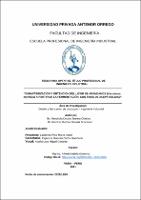Caracterización y obtención del licor de arándanos (Vaccinium myrtillus) a partir de la fermentación con fines de aceptabilidad

Ver/
Descargar
(application/pdf: 96.79Kb)
(application/pdf: 96.79Kb)
Fecha
2022Autor(es)
Menchola Dedios, Jeanna Chakira
Ramírez Ramos, Daniela Shammer
Metadatos
Mostrar el registro completo del ítemResumen
El presente estudio tuvo como objetivo general Caracterizar y obtener el licor
de arándanos (Vaccinium myrtillus) a partir de la fermentación utilizando dos
tipos de reactores, con fines de aceptabilidad; determinando así el mayor nivel
de aceptabilidad de cada factor. Realizar un solo análisis fisicoquímico y
microbiológico del mejor tratamiento, para la realización de esta investigación
se utilizó el arándano, por consiguiente se llevó a cabo la descripción de
operaciones desde la recepción de la materia prima hasta el envasado. Se realizó
4 tratamientos distintos; los primeros tratamientos en los reactores de plástico y
los últimos 2 siguientes en reactores de madera. En el proceso de estrujado se
evaluó la dilución de mosto y agua de 2.5L a 2L y 2.5L a 1.5L, agregándole 100g
de azúcar por cada litro que hay entre la mezcla de mosto y agua, para dar inicio
a la fermentación se corrigió el mosto entre los valores de 20 y 25 °Brix, por
consiguiente se paró la fermentación en 16°Brix, teniendo como resultado el
mejor tratamiento. Las variables que se evaluaron fueron los atributos
sensoriales como olor, color y sabor. Mediante dos análisis sensoriales se
determinó el mejor tratamiento, como también el mejor reactor para la
fermentación al elaborar el licor de arándanos, la mayor aceptabilidad se ubicó
en Bueno y Muy bueno teniendo un rango de 78% y 98%. Siendo el mejor
tratamiento el número 4, con 38 grados de alcohol, 3.18 pH, y 16° Brix.Asi
mismo el análisis microbiológico que el producto es inocuo ya que está dentro
de la NTP 211.009 indicando de esta manera que es apto para el consumo
humano The present study was carried out at the Antenor Orrego-Piura Private University. Its
main objective was to characterize and obtain the blueberry liquor (VACCINIUM
MYRTILLUS) from the fermentation using two types of reactors, with the purpose of
acceptability; thus determining the highest level of acceptability of each factor. To carry
out a single physicochemical and microbiological analysis of the best treatment, for the
realization of this investigation the cranberry was used, therefore the description of
operations was carried out from the receipt of the raw material until the packaging. There
were 4 different treatments; the first treatments in the plastic reactors and the last 2
following in wooden reactors. In the crushing process, the dilution of must and water
from 2.5L to 2L and 2.5L to 1.5L was evaluated, adding 100g of sugar for each liter
between the mixture of must and water, to start the fermentation it was corrected the must
between the values of 20 and 25 ° Brix, therefore the fermentation was stopped at 16 °
Brix, resulting in the best treatment. The variables that were evaluated were the sensory
attributes such as smell, color and taste. By means of two sensorial analyzes, the best
treatment was determined, as well as the best reactor for fermentation when making the
blueberry liquor, the highest acceptability was Good and Very good, having a range of
78% and 98%. The best treatment is the number 4, with 38 degrees of alcohol, 3.18 pH,
and 16 ° Brix. The same microbiological analysis that the product is safe since it is within
the NTP 211.009 indicating in this way that it is suitable for consumption human.
Palabras clave
Colecciones
- Ingeniería Industrial [356]

